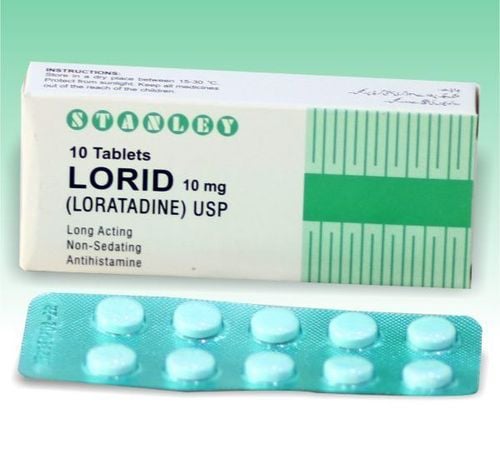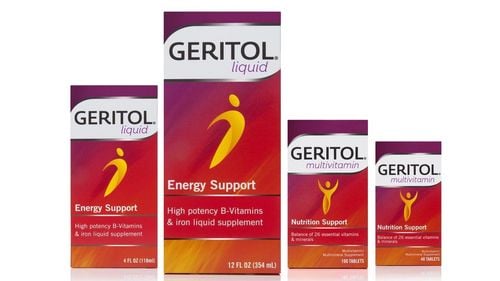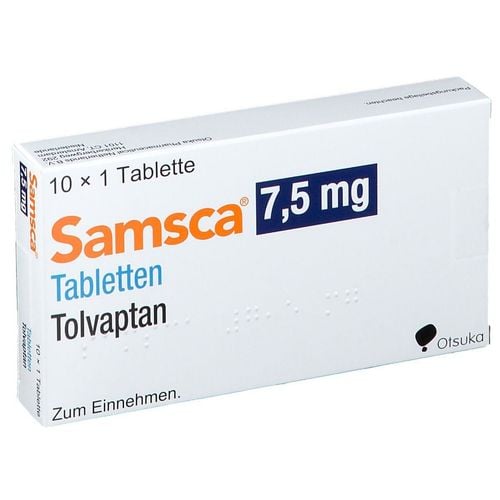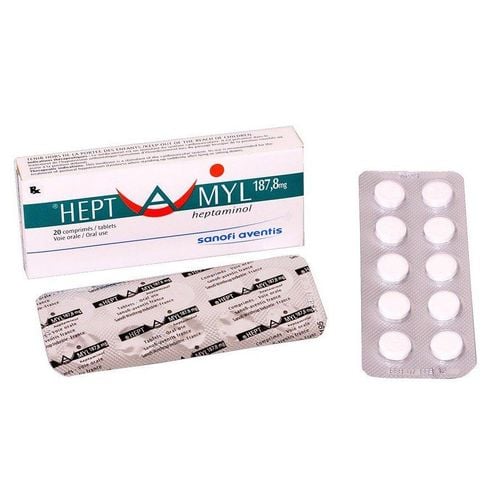This is an automatically translated article.
Diamtion medicine is formulated in the form of a syrup with essential vitamins and minerals. Medicines are used to help children eat well, grow quickly and develop comprehensively. Read the following article to get more information about this drug.
1. What are the uses of Diamtion?
Diamtion drug with ingredients including vitamin A, vitamin B1, vitamin B6, vitamin B12, vitamin B2, Vitamin B3, vitamin D3, lysine hydrochloride, iron, calcium and magnesium.
The drug is indicated to supplement vitamins, minerals and lysine for the body, to help children eat well, grow quickly and develop comprehensively. The drug also helps prevent and treat vitamin and mineral deficiency cases due to weakness of the body, during recovery (after illness, infection or surgery), pregnant or lactating women. .
Diamtion is contraindicated in the following cases:
Patients with hypersensitivity to one of the ingredients in the formula. Vitamin A : Patients with an excess of vitamin A Vitamin D: Patients with hypercalcemia or vitamin D toxicity Vitamin B: Patients with a history of allergy to cobalamin. Patients with malignancies, allergic conditions (asthma, eczema). Iron sulphate: The patient is sensitive to iron II sulfate, has iron-contaminated tissue disease, hemosiderin infection, hemolytic anemia, narrowing of the esophagus and sacs of the gastrointestinal tract. Calcium glycerophosphate: Avoid prolonged use in patients with renal impairment and/or hypercalcemia, concomitantly with Digoxin. Magnesium gluconate: Not for use in patients with renal failure.
2. Usage and dosage of the drug Diamtion
Diamtion is used once a day with specific doses as follows:
Children under 1 year old: Take 2.5ml (half a teaspoon)/day Children from 1-12 years old: Take 5ml (1 teaspoonful) )/day. Children over 12 years old: Take 10ml (2 teaspoons)/day. Note that the above dosage is for reference only. Patients should consult their healthcare professional for the most appropriate dosage.
3. Undesirable effects of the drug Diamtion
Diamtion may cause mild gastrointestinal upset including nausea and vomiting. In addition, long-term use of high doses of vitamin A can lead to vitamin A poisoning with typical symptoms of fatigue, irritability, loss of appetite, weight loss, vomiting, digestive disorders, fever, liver enlarged spleen, hair loss, dry brittle hair, chapped lips, anemia, headache, hypercalcemia, subcutaneous edema and pain in joints....
Children may experience symptoms of chronic poisoning Symptoms include increased intracranial pressure (stretch fontanelle), papilledema, tinnitus, visual disturbances, and painful swelling along the long bones. Most symptoms disappear when the drug is stopped.
Besides, taking an overdose of vitamin D3 can also lead to vitamin D poisoning. The initial symptom of vitamin D poisoning is hypercalcemia.
4. What are the precautions when using Diamtion?
During the time of taking the drug, the urine may be yellow because it contains vitamin B, when stopping the drug, the above phenomenon will disappear. Caution should be exercised when used with other drugs containing vitamin A. Diamtion should be used with caution in patients with sarcoidosis, hypoparathyroidism, renal failure, heart disease, kidney stones, atherosclerosis. Taking vitamin B6 at a dose of 200 mg/day and for a long time can make peripheral neuropathy and sensory neuropathy worse. In addition, patients may also be dependent on vitamin B6. Care should be taken when administering Diamtion to patients with suspected gastric ulcer, ileitis or chronic ulcerative colitis. Diamtion can be used by pregnant or lactating women. However, patients should consult a healthcare professional before taking to avoid duplication of overdose.
5. Diamtion . Drug Interactions
Concurrent use of Diamtion with some drugs may cause drug interactions, change the therapeutic effect and/or increase the toxicity of the drug. Therefore, patients should inform their doctors about all prescription and non-prescription drugs and dietary supplements they are using for appropriate advice and adjustment. The following are some of the drug interactions of Diamtion that require clinical attention:
Neomycin, liquid paraffin and cholestyramine may reduce vitamin A absorption. Oral contraceptives may increase vitamin A serum concentrations and not favorable for conception. Concomitant use of vitamin A with isotretinoin should be avoided as it may lead to symptoms such as vitamin A overdose. Concomitant use of vitamin D with cholestyramine or colestipol hydrochloride is not recommended because it may reduce intestinal absorption of vitamin D. Excessive use of mineral oil can interfere with the absorption of vitamin D in the intestine. Concomitant use of vitamin D with thiazide diuretics in patients with hypoparathyroidism may result in hypercalcemia. In this case, it is necessary to reduce the dose of vitamin D or temporarily discontinue vitamin D. Use of thiazide diuretics in patients with hypoparathyroidism causes hypercalcemia presumably due to increased calcium release from bone. Concomitant use of vitamin D with phenobarbital, phenytoin and other inducers of liver enzymes is not recommended because these drugs may decrease plasma concentrations of 25 - hydroxy ergocalciferol and 25 - hydroxy - cholecalciferol, increasing vitamin metabolism. D into inactive substances. Concomitant use of vitamin D with corticosteroids is not recommended because corticosteroids may interfere with the action of vitamin D. Concomitant use of vitamin D with cardiac glycosides is not recommended because cardiac glycoside toxicity may increase due to hypercalcemia. lead to arrhythmias. There have been some cases of "riboflavin deficiency" in people who have taken imipramine, clopromazine, amitriptyline and adriamycin. Concomitant use of probenecid with riboflavin causes reduced absorption of riboflavin in the stomach and intestines. Vitamin B6 may decrease the effect of the drug levodopa in the treatment of Parkinson's disease. However, this does not occur when used with a mixture of levodopa - carbidopa or levodopa - benserazide. Doses of vitamin B6 200 mg/day may cause decreased phenytoin and phenobarbital concentrations in some patients. Vitamin B6 may reduce symptoms of depression in women taking oral contraceptives. In addition, oral contraceptives can increase the need for vitamin B6 In summary, Diamtion is a syrup that provides a variety of vitamins, minerals and lysine for the body. To ensure optimal effectiveness of the drug, patients should consult their doctor or pharmacist before use.
Please dial HOTLINE for more information or register for an appointment HERE. Download MyVinmec app to make appointments faster and to manage your bookings easily.













